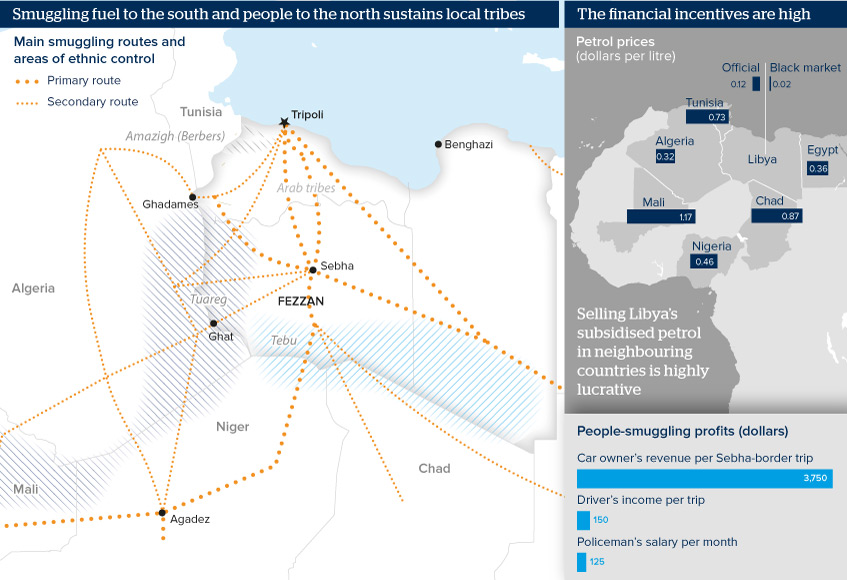Marginalisation will sustain smuggling in Libyan south
Smuggling fuel and people is the only economic option for many in the southern deserts
Source: International Crisis Group, 'How Libya’s Fezzan Became Europe’s New Border'; LSE African Perspectives on Migration blog, 'What incentives does Niger have for cracking down on migrant smuggling? Not many'; globalpetrolprices.com
Outlook
The southern area of Libya, the Fezzan, is a sparsely populated and neglected region. Following the collapse of the state in 2011, the Fezzan’s Arab, Tuareg and Tebu inhabitants have striven to improve their position in society. Muammar al-Qadhafi favoured some southern Arab tribes and neglected others. His Arabisation policy systematically excluded minorities. Investment in their education and services was low and many Tebu and Tuareg lack identity papers and citizenship.
As a result, legitimate economic opportunities are few. The post-2011 chaos has allowed gains to be made from smuggling arms, fuel and people. Competition for these resources and meddling by political actors from northern Libya have caused severe fighting in recent years.
Impacts
- Fighting in the south is likely to recur as northern Libyan meddling shakes fragile equilibria.
- Lack of effective policing, education and legitimate job opportunities will drive local youths to the smuggling industry.
- Extremist and other armed actors are likely to exploit these conditions to recruit.
- The underlying structural factors will spoil Italian and French efforts to collaborate with local groups to stop people-smuggling.
See also
- Armed groups will keep dominating southern Libya - Nov 12, 2021
- Socio-economic dynamics allow Chad rebels to endure - Jul 19, 2021
- Sahel border closures disrupt food supply chains - Jul 7, 2020
- Neglect of Sahel border regions will sustain smuggling - Jan 29, 2020
- Southern Libya will be more restive - Oct 9, 2019
- Tuareg nationalism will be limited to Mali - Aug 28, 2019
- North Africa smuggling crackdowns risk unrest - Jun 8, 2018
- Fuel smuggling perpetuates Libya instability - Apr 20, 2018
- Libya elites will have no traction on Sebha conflict - Mar 20, 2018
- Illicit business boosts Chad-Sudan-Libya borderlands - Nov 20, 2017
- West African border control will be tenuous - Oct 25, 2017
- NGO hiatus is unlikely to reduce Libya migrant flows - Aug 14, 2017
- Sahel dynamics foster illicit economies - Jul 31, 2015
- More graphic analysis
